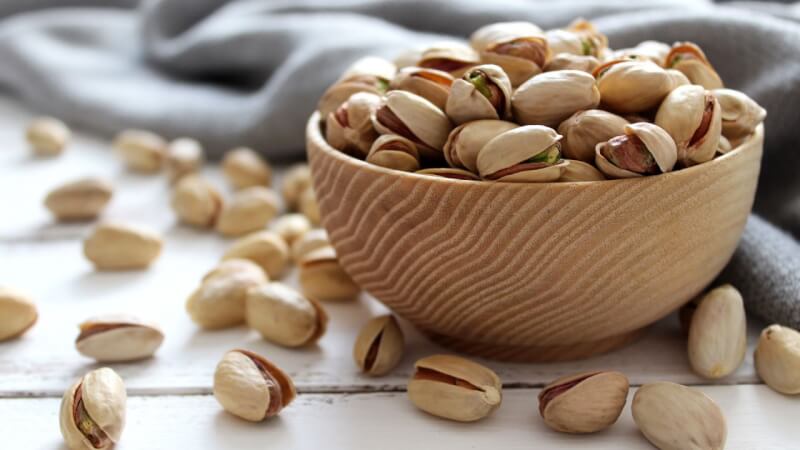Are you seeking to enhance your sleep quality? Consider integrating pistachios into your nightly snack routine. Their significant benefits might surprise you. In this piece, we’ll unpack the science supporting pistachios as potent sleep enhancers.
Why Pistachios Make for an Excellent Bedtime Snack
Pistachios are a superlative choice for a bedtime snack, packed with vital nutrients known to foster improved sleep. Here are some of the key ones:
- Magnesium: An indispensable mineral, magnesium plays a pivotal role in governing our body’s natural sleep cycle. Its calming effect on the brain fosters deeper, more restful sleep.
- Protein: Essential for tissue building and repair throughout our bodies, including muscles and bones. Consuming protein before bed can help us feel satiated longer, which may curtail nighttime snacking and enhance overall sleep quality.
- Vitamin B6: Integral to the production of serotonin, often dubbed the “happy hormone,” Vitamin B6 is essential in regulating mood, appetite, and sleep.
- Tryptophan: This amino acid is present in many foods and aids in the production of serotonin and melatonin, another crucial hormone associated with promoting healthy circadian rhythms.
- Low Glycemic Index (GI): Among all nuts, pistachios have one of the lowest glycemic indexes, meaning they don’t cause significant spikes in blood sugar levels post-consumption.
How Pistachios Enhance Sleep Quality
Understanding the unique nutrient profile of pistachios, let’s explore how these elements synergize to make them exceptional aids for promoting high-quality rest:
- Promotes Relaxation: Magnesium and Vitamin B6 are instrumental in fostering relaxation and reducing anxiety and stress, culminating in a better sleep experience.
- Regulates Circadian Rhythm: The tryptophan in pistachios boosts serotonin production, which aids in regulating sleep patterns by controlling the body’s natural circadian rhythm.
- Hormone Balance: Melatonin, naturally produced by our bodies when it’s dark, is part of our natural sleep-wake cycle. The high levels of tryptophan in pistachios are converted into melatonin, promoting feelings of sleepiness and more restful nights.
How Many Pistachios to Consume Before Bed
While integrating pistachios into your nighttime routine could enhance your sleep quality, it’s important to manage portion sizes. Despite being relatively low-calorie (approximately 160 calories for 30g), controlling portions is crucial as excessive consumption can lead to weight gain, often linked to restless nights.
A single serving, around 1 ounce or roughly 49 kernels, is a good rule of thumb. For a slightly sweeter touch before bed, a sprinkle of cinnamon on a handful of pistachios works wonders!
Conclusion
Pistachios are nutrient-rich snacks with proven potential to improve sleep quality. Their unique composition promotes relaxation while increasing serotonin and melatonin production, which are vital for regulating mood and maintaining healthy circadian rhythms. In moderation, as part of a balanced diet, pistachios can offer numerous health benefits, not the least of which is that they are a fantastic bedtime snack option!
In addition to a good diet, choosing the right mattress is also vital for quality sleep. Visit Inn Mattress for a wide range of options, and explore our Ultimate Guide for Low Back Pain Sufferers to ensure your mattress supports your health needs.
FAQs
Yes, research has shown that eating pistachios may improve both the quality and quantity of sleep. Pistachios contain magnesium, which can help relax muscles and promote calmness in the body. They also have protein, fiber, and healthy fats that can keep you feeling fuller for longer without disrupting your sleep.
It is recommended to consume a 1-ounce serving of pistachios before bedtime to aid in promoting better sleep. This translates to about 49 kernels or so, depending on their size.
Yes! Pistachios are rich in antioxidants such as lutein, zeaxanthin, and gamma-tocopherol, which can work to reduce inflammation in the body and reduce oxidative stress damage caused by free radicals; They can also improve cholesterol levels by increasing “good” HDL levels while decreasing triglycerides (harmful fat molecules). Plus, they’re a great source of protein for maintaining muscle mass and supporting metabolism overall!

